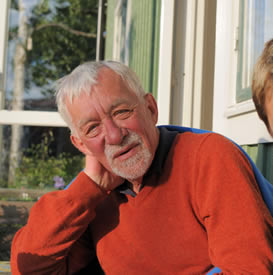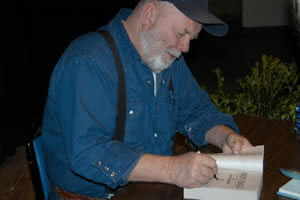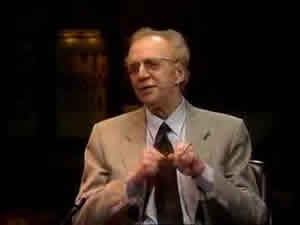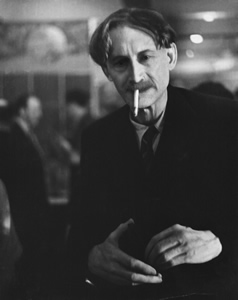De Zweedse dichter en schrijver Lars Gustafsson werd geboren in Västeras, op 17 mei 1936. Zie ook alle tags voor Lars Gustafsson op dit blog.
Elegie auf einen Labrador
Mitten im Sommer gibt es bei uns Tage,
an denen es plötzlich Herbst ist.
Die Krähen im Baum schlagen schärfere Töne an.
Die Klippen ragen deutlicher aus dem See als sonst.
Sie wissen etwas. Sie haben es immer gewußt.
Wir auch, doch wollen wir nichts davon wissen.
Auf dem Heimweg bist du oft am Bug gestanden,
an solchen Abenden, hast den Gerüchen nachgespürt,
die übers Wasser kamen, mit ruhig gesammelten Blick,
den Abend entziffert, die schwache Rauchfahne
eines Sommerhauses, den Pfannkuchen, der irgendwo
drei Kilometer weiter briet, einen Dachs bemerkt,
der ich weiß nicht wo in der Dämmerung stand
und etwas witterte, ganz wie du. Unsere Freundschaft
war natürlich ein Kompromiß: wir lebten zusammen
in zwei verschiedenen Welten, der meinigen
mit ihren Buchstaben, einem lebenslänglichen Text,
und der deinen mit ihren Gerüchen. Ich hätte viel
für deine Kenntnisse gegeben, für dein Vermögen,
ein Gefühl wie Eifer, Haß oder Liebe wie eine Welle
über den ganzen Körper hinlaufen zu lassen
von der Nase bis zum Schwanz, für deine Unfähigkeit,
dich damit abzufinden, daß der Mond eine Tatsache ist.
Bei Vollmond hast du dich lauthals darüber beklagt.
Als Gnostiker warst du mir überlegen, und somit
hast du dauernd im Paradies gelebt. Auch pflegtest du
Schmetterlinge aufzuschnappen im Sprung und sie dann
hinunterzuschlucken. Abstoßend fanden manche das.
Mir gefiel es. Warum habe ich es dir darin
nie gleichtun können? Und dann die Türen!
Waren sie zu, so legtest du dich hin und schliefst ein;
irgend jemand würde sie sicherlich öffnen,
früher oder später. Du hattest recht. Ich hatte unrecht.
Heute, da diese lange, stumme Freundschaft vorbei ist
für immer, frage ich mich, ob auch ich am Ende
etwas konnte, was dir imponiert hat. Ich meine nicht
deinen festen Glauben, daß ich es war, der die Gewitter
hervorrief. Das war ein Wahn. Ich denke eher,
mein sichres Gefühl dafür, daß der Ball vorhanden war,
auch wenn er sich hinter dem Sofa versteckt hielt,
hat dir eine Ahnung verschafft von meiner Welt.
Fast alles in meiner Welt hält sich versteckt
hinter etwas anderem. Ich nannte dich“Hund”.
Ich frage mich ganz im Ernst: Hast du mich wohl
für einen größern, lauteren “Hund” gehalten,
oder für etwas anderes, etwas für immer Unbekanntes,
das einfach ist, was es ist, und existiert
auf seine Weise und damit basta: den Pfiff
durch den nächtlichen Park, dem zu folgen
man sich angewöhnt hat ohne so recht zu wissen,
was das ist, dem man folgt. Und ich
wußte ebensowenig von dir und davon, was du warst.
Von diesem objektiveren Standpunkt aus
waren wir zwei Organismen, zwei jener Orte,
an denen das Universum sich in sich selber
verknotet, verwickelt, kurzlebige, komplexe Strukturen
aus Eiweiß, die sich immer weiter verheddern müssen,
um zu überleben, bis das Ganze versagt
und sich wieder vereinfacht, der Knoten sich löst,
das Rätsel verschwindet. Du warst eine Frage,
gerichtet an eine andere Frage, sonst nichts,
und keine von beiden konnte der andern Antwort geben.
Vertaald door Hans Magnus Enzensberger

De Deense schrijver Peter Høeg werd geboren in Kopenhagen op 17 mei 1957. Zie ook alle tags voor Peter Høeg op dit blog.
Uit: The Quiet Girl (Vertaald door Nadia Christensen)
„SheAlmighty had tuned each person in a musical key, and Kasper could hear it. Best in the brief, unguarded moments when people were nearby but didn’t yet know he was listening. So he waited by the window, as he was doing now.
It was cold. The way it could be only in Denmark, and only in April. When, in mad enthusiasm for the spring light, people turned off the central heating, brought their fur coats to the furrier, dispensed with their long underwear, and went outside. And only when it was too late, discovered that the temperature was at freezing, the relative humidity 90%, and the wind was from the north and went straight through clothing and skin, deep into the body, where it wrapped itself around the heart and filled it with Siberian sadness.
The rain was colder than snow, a heavy, fine rain that fell like a gray silk curtain. From behind that curtain a long black Volvo with tinted windows appeared. A man, a woman, and a child got out of the car, and at first it looked promising.
The man was tall, broad-shouldered, used to getting his own way—and capable of having a powerful impact on those around him if he didn’t. The woman was blond as a glacier and looked like a million bucks; she also looked smart enough to have earned it herself. The little girl had dignity and wore expensive clothes. It was like a tableau of a holy, wealthy family.
They reached the center of the courtyard, and Kasper got his first sense of their musical key. It was D-minor, at its worst. As in Toccata and Fugue in D-Minor. Great fateful pillars of music.
Then he recognized the little girl. At that precise moment the silence occurred.
It was very brief, perhaps a second, perhaps not at all. But while it lasted, it obliterated reality. It took away the courtyard, the rehearsal ring, Daffy’s office, the window. The bad weather, the April month. Denmark. The present time.
Then it was over. Vanished, as if it had never existed“.

De Amerikaanse schrijver Gary Paulsen werd geboren op 17 mei 1939 in Minneapolis, Minnesota. Zie ook alle tags voor Gary Paulsen op dit blog.
Uit: Brian’s Return
„Brian sat quietly, taken by a peace he had not known for a long time, and let the canoe drift forward along the lily pads. To his right was theshoreline of a small lake he had flown into an hour earlier. Around him was the lake itself, an almost circular body of water of approximatelyeighty acres surrounded by northern forest—pine, spruce, poplar and birch—and thick brush.
It was late spring—June 3, to be exact—and the lake was teeming, crawling, buzzing and flying with life. Mosquitos and flies filled theair, swarming on him, and he smiled now, remembering his first horror at the small blood drinkers. In the middle of the canoe he had an old coffee can with some kindling inside it, and a bit of birchbark, and he lit them and dropped a handful of green poplar leaves on the tiny fire. Soon smokebillowed out and drifted back and forth across the canoe and the insects left him. He had repellant with him this time—along with nearly twohundred pounds of other gear—but he hated the smell of it and found it didn’t work as well as a touch of smoke now and then. The blackflies anddeerflies and horseflies ignored repellant completely—he swore they seemed to lick it off—but they hated the smoke and stayed well off thecanoe.
The relief gave him time to see the rest of the activity on the lake. He remained still, watching, listening.“

Gary Paulsen (Minneapolis, 17 mei 1939)
De Britse schrijver Dennis Potter werd geboren op 17 mei 1935 in Forest of Dean, Gloucestershire. Zie ook alle tags voor Dennis Potter op dit blog.
Uit: Dennis Potter: Showing ‘The Very Age and Body of the Time His Form and Pressure’ (Dissertatie van Paul A. Ferguson)
‘Adieu, Adieu, Adieu. Remember Me’: Karaoke and Cold Lazarus
There’s an uneasy moment towards the end of the third episode of Cold Lazarus when, as Martina Matilda Masdon speaks across the Atlantic via autocube to Emma Porlock, the writing begins to seem profoundly awkward, uncharacteristic, forced, un-natural even:
Masdon: … register what I have to say.
Emma: I am registering, Ms Masdon.
Masdon’s voice: First, why do you behave in a way that could lead an uncharitable person to conclude that you are a nasty two-faced, two-timing sewer rat?
Emma: Which uncharitable person would that be, Ms Masdon? I only know of one such.
It may seem uncharitable of me to mention such a lapse, and indeed in so doing it might be seen as a progression down the slope towards the subjective ‘nastiness’ of Literary Criticism indicated by Philip Marlow with ‘swine to the left of [me], swine to the right of [me], grunt grunt’.But then that would be to assume, again uncharitably, that in making such a point I merely wanted to say that Potter ‘didn’t write this bit very well’. Although evidently a point of departure, this is not my intention.“

Dennis Potter (17 mei 1935 – 7 juni 1994)
De Franse dichter en schrijver Henri Barbusse werd geboren op 17 mei 1873 in Asnières-sur-Seine. Zie ook alle tags voor Henri Barbusse op dit blog.
La Pleureuse
Oh bien des fois, au gré du rêve où tu te penches,
Tu vis le hameau calme avec ses maisons blanches,
Et la paix de l’azur a fait pleurer ta paix.
Et bien des fois, la nuit, lorsque tu regardais,
J’ai senti ta douleur monter jusqu’aux étoiles,
Et te vis épier dans l’ombre aux ombres pâles
Cet immense malheur qu’on ne peut pas savoir…
Lorsque nous regardons monter la mer du soir,
Ainsi que deux faux dieux sur les mornes rivages,
Nous voyons devant nous passer de grands veuvages
Et c’est ton désespoir qui souffre avec douceur.
Désert de ton frisson, pauvreté de ton cœur !
Et tu vas inquiète, et très calme et très seule,
Ô si jeune âme avec des mains comme une aïeule,
Toi qui, pauvre rêveuse, avais aux temps lointains
Dans les nuits de bonheur des songes enfantins,
Qui, bercée à la voix d’aurore qui se lève
Et souriante encor d’une écharpe de rêve,
Dans le ciel du matin n’as trouvé que l’azur !
Si le dieu de cœur simple est le seul dieu très pur,
Pleure la grande vie et tout ce que vous faites,
Ô vous qui souriez, ô ceux que tu rachètes
Quand lasse, dans les champs d’étés et de sommeil,
Tu sens se dévaster la pitié du soleil !
Et je te dis souvent que nous sommes sublimes
Et qu’il est un mystère, et que nous l’entendîmes ;
Et je te dis cela quand nous nous effleurons,
Quand le demi-sommeil laisse errer nos deux fronts
Et que la lampe est douce au fond de l’âme close…
Et sans me regarder, tu pleures d’autre chose.

Zie voor nog meer schrijvers van de 17e mei ook mijn blog van 17 mei 2011 deel 2.
